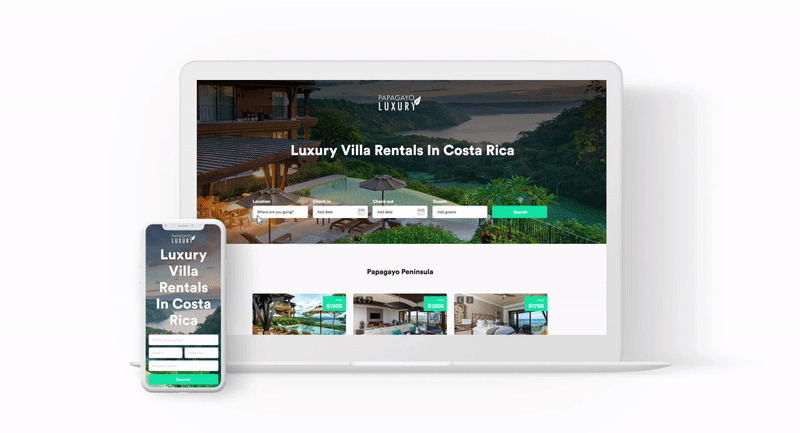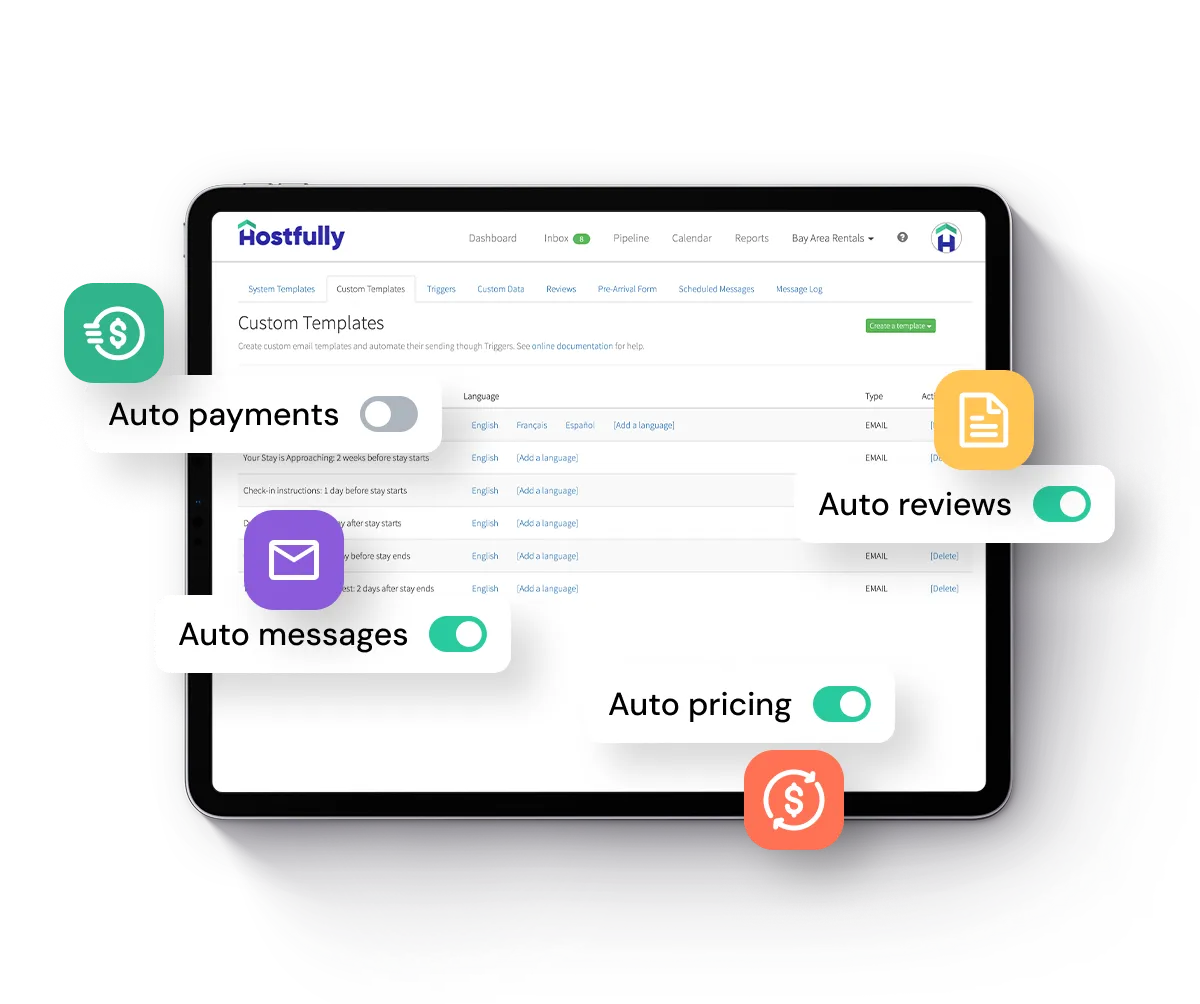Many hosts find Airbnb’s price structure confusing. Between host and guest service fees and optional add-ons, it’s not always clear how much you actually get charged.
It may be tempting to just pick a fee structure and hope for the best. But if you choose incorrectly, you could lose income and affect the profitability of your short-term rental business. That goes double if you rely on Airbnb to list your properties and take bookings.
So, take a moment to read our guide and understand how Airbnb host fees work. We break down what exactly the platform charges hosts, what this means in practice, and what you can do to protect your margins.
What are Airbnb host fees?
Airbnb host fees are a small fee applied to the booking subtotal. It’s based on the full amount, so that’s the nightly rate plus cleaning fees, pet fees, and additional services. (Of course, refundable expenses like security deposits are exempt.)
This pricing model is what makes Airbnb work. Fees cover the basic costs of running the platform and go toward listing management, secure payment processing, and customer support.
Plus, while nobody likes the idea of fees, hosts get a lot of support in return. Many small teams and new businesses may even find it more cost-effective than handling these processes themselves.
There’s no extra work required on the host’s part, either. All Airbnb service fees are applied automatically when guests make a payment through the platform. The platform automatically calculates and deducts the amount from what you receive before transferring the cash to your account.
How do Airbnb fees work? A look at the platform’s different fee structure
There are two different ways to structure your Airbnb fees: split fee and host only. Let’s look at both in detail to see how they compare:
Split fee
The split-fee structure divides Airbnb services between you and your guests. You pay 3% of the booking total and they pay the remaining amount, typically between 6% to 12%.
Remember that this rate is applied to the total payment. If the guest pays $100 for the night plus a $30 cleaning fee, for example, Airbnb deducts $3.90 from your transfer. This leaves you with $126.10 overall.
Recent data shows that the split-fee model is the most popular, especially among businesses with multiple properties. As Phillip Foxall of Catchin’ Paradise says, “This is the default structure for individual hosts and allows us to keep our base nightly rate lower—something many price-conscious guests appreciate.”
Host-only fee
The host-only fee structure is exactly like it sounds. You bear the burden for the entire total cost of the, which is typically between 14% to 16% (more if you have a super strict cancellation policy). Foxall says, “While the guest experience might be more streamlined under the host-only model, it ultimately results in a higher cut from our end.”
If you charged $100 for the night plus $30 for cleaning, for instance, Airbnb might deduct up to $20.80 from the total.
Some property management software (PMS) only support the host-only structure. Do you need to use the split-fee model? Make sure you sign up with a provider like Hostfully that lets you choose between both options.
Learn more about Hostfully’s Airbnb integration and how it works.
What else does Airbnb charge? Additional fees to know about
Besides the host fees, there are other Airbnb charges that you have to factor into your financial planning.
- Cancellation fees: Airbnb charges hosts up to 50% of the reservation total for the nights not stayed. They only waive the fee if you have a valid reason for cancelling, such as a serious illness or a natural disaster.
- VAT (Value Added Tax): Airbnb may be responsible for applying VAT depending on your business setup and the local laws.
- Currency Conversion: If a guest pays in a different currency than the one used in your home country, Airbnb may charge you for conversion. The amount depends on the two countries involved.
- Transient occupancy tax: Airbnb may apply a local tax to guest payments. While you don’t technically pay this money, you may still need to report it on your tax return.
Note that Airbnb doesn’t charge co-hosts anything directly. You must decide how much to pay them and account for the service fees in this amount.
Airbnb gives you a choice of payout structures for your co-hosts. You can offer them a share of the cleaning fee, a percentage of each guest payment, or a fixed sum per booking. Once you’ve decided, Airbnb automatically calculates and transfers the money to any co-hosts you’re working with.
Five tips to reduce and offset Airbnb’s host fees
Airbnb listing fees are an inevitable part of running a vacation rental management. They’re what enables the platform to keep running smoothly and drawing large numbers of guests.
But that doesn’t mean you have to do nothing. With the right strategy, you can reduce their impact on your finances while ensuring high occupancy rates and meeting Airbnb requirements.
Nudge potential guests to your direct booking site
While Airbnb bans you from linking away from the platform in your listing pages, that doesn’t mean you can’t benefit from a direct booking site. You can always count on some traffic from Google and social media platforms like Facebook and Instagram.
Plus, many Airbnb users may search for your website on the off chance you offer lower rates for direct bookings. You have a chance to prove them right and confirm their decision to stay at one of your properties.
Just make sure you offer a professional and user-friendly online experience. Outdated or clunky websites may have the opposite effect and deter potential guests from using your business. Always make it mobile responsive with clear pricing and quality photos to keep everywhere there until they’ve completed their reservation.
Use a no-code tool like Hostfully to create your website. Our platform lets you design and customize web pages based on your brand identity and upload your own content. Worried about double bookings? We also enable you to sync your direct booking website with popular listing sites like Vrbo, Airbnb and booking.com to share data seamlessly.

But there’s no need to abandon Airbnb entirely. The platform is a great move for vacation rental operators as it’s often the first choice for all types of travelers. You can still use it to get exposure while encouraging more direct bookings through your website.
Plus, as Robert Batholomew of Mountain Management says, diehard Airbnb users may not appreciate your property disappearing from the listing platform. “It’s important to recognize that removing a service viewed as essential by loyal guests can quickly erode their trust – and potentially lose them for good.”
Incentivize Airbnb guests to stay longer
Longer stays are a great way to maximize your income. While Airbnb host fees increase proportionally, you can reduce your turnover and maintenance costs.
Incentivize longer stays by offering discounted rates for staying at least a week, two weeks, or a month. These offers are likely to attract travelling workers and digital nomads who settle in one place for a while. Just ensure offers make financial sense and don’t exceed what you’d spend on turnover anyway.
Also, check that your Airbnb properties are ready for long-term guests. They’ll need access to a kitchen and a washing machine at a minimum. If they’re planning to work during their stay, they’ll also probably want a quiet workspace with a reliable WiFi connection.
As your finances are likely to change, Batholemew recommends frequent checks. He says, “Regular reviews of operational expenses and vendor contracts are essential to prevent fees from escalating.”
Encourage repeat bookings off Airbnb
Inviting guests to book directly with you next time is a good way to avoid fees. Often, you can simply ask them and include a link to your direct booking website in your follow-up email.
Some guests may need encouragement as they prefer the security of the Airbnb platform. Consider offering them a discount and explaining that you can charge less since fees no longer apply. Again, make sure whatever you offer makes financial sense.
Hostfully can help you manage this automatically. Our messaging feature lets you create templates with empty fields and triggers for every stage of the guest’s stay, including thank you and follow-up emails. We let you include promo codes in emails that guests can apply at the checkout on your direct booking website.
Better yet, Hostfully gives you a high level of control over discounts. You decide how much, which properties, and how long they remain valid, so promotions can always be tailored to your Airbnb pricing strategy.

Besides all this, hosts can try using covert methods to get visitors to book directly. Foxall says, “We use digital guidebooks that enhance the guest experience while subtly promoting our direct booking site for future stays. It’s a seamless, guest-friendly way to stay connected while gently encouraging them to book directly next time.”
If you wish to go this route, consider using Hostfully to create a customized digital guidebook. You can add images, text, and links to outside sources — including your website.
Use dynamic pricing tools
Selecting the most optimal nightly rate can help you maximize your income and thereby minimize the impact of host fees. You can find the right balance to attract guests while maximizing your profits.
Airbnb has a Smart Pricing tool that helps you find the best prices. It adjusts your nightly rates automatically based on demand, seasonality, or local booking trends. The only problem is that Airbnb Smart Pricing is tailored for the platform, so it’s suitable for businesses that advertise listings elsewhere.
Specialist dynamic pricing tools can offer you more flexibility and control. They integrate with all your listing platforms, your direct booking site, and your PMS to let you adjust prices everywhere. Leading tools also factor in local events and weather patterns as well as general market data.
Limit the number of cancellations
Avoid cancelling bookings unless absolutely necessary to avoid Airbnb’s high penalties. You should ensure you can continue with bookings unless you have a valid reason according to the platform’s rules.
Here are some ways to lower the chance of host cancellations:
- Use a channel manager to sync listing data and minimize the risk of double bookings
- Set a minimum advance notice on Airbnb to avoid rushed bookings and errors
- Invest in property maintenance and care to ensure properties are ready
- Conduct regular checks to find issues that could make properties inhabitable
- Have people who can take over if you become incapacitated
Stop Airbnb fees from cutting into your profits with Hostfully PMS
Airbnb fees can take a sizeable chunk of your earnings, especially if you rely solely on the platform for business. You must take control of how you charge guests and where bookings come from to limit their impact on your finances.
Listing across a variety of platforms and launching a website can reduce your dependency on Airbnb. You still reach potential guests, but you can take more direct bookings and reduce the ratio of your income that goes to fees.
Hostfully is here to help with that. Our channel manager makes it easy to advertise on various platforms and sync property, guest, and reservation details. We also offer a direct booking website that you can tailor to your unique brand.
Plus, Hostfully PMS automates key operations so you can save time and money across multiple areas of your business — no matter where you list.
FAQs about Airbnb host fees
Does Airbnb charge different fees based on location?
Yes, Airbnb charges different fees based on your location, but there isn’t a significant difference. Your choice of fee structure has a bigger impact on the total.
Can hosts pass all Airbnb fees to guests?
No, hosts can’t pass all Airbnb fees to guests. You’re expected to contribute at least 3% of the total price, plus VAT and currency conversions in some cases.
Are there hidden Airbnb fees hosts should know about?
No, there are no hidden Airbnb fees hosts should know about. The platform publicly lists all its host service fees on its help pages, so you understand how much you need to pay.
If a guest cancels, do hosts still pay fees?
Yes, if a guest cancels and the host accepts some payment, Airbnb takes some of the money in fees. Otherwise, you’re not expected to pay anything.


